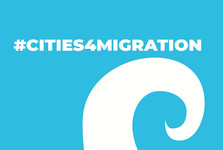Whether or not they cross countries’ borders, human mobility flows essentially converge towards urban areas. Although cities and local governments lack recognition and competence for migration policies, local administrations must guarantee social cohesion and the Right to the city. Both objectives are closely linked to the local governance of migration and, in particular, to the ability of cities to help vulnerable groups break down barriers that prevent them from accessing basic services, protecting their rights and enjoying decent living conditions.
Global agendas increasingly assume that their development and welfare goals will hardly be met without addressing the status of migrant and displaced people. In addition to paying particular attention to migrants in SDGs 10 and 11 and the New Urban Agenda, the international community adopted the first Global Compact on Migration in December 2018.
The Global Compact on Migration marks a breakthrough in the global governance of migration with a proposed framework and common values for defining national migration policies. In particular, rights-based approaches and the involvement of all governments are advances for the recognition and guarantee of migrants' rights and the involvement of local governments in the governance of migration.
However, local governments must ensure the process and advocate for full and formal recognition of their role in the implementation, monitoring and review of the Global Compact.
In this context, UCLG acts globally, making visible and accompanying the action of local governments in the governance of migration from three self-reinforcing angles:
The newly established Mayors Mechanism is a tool for dialogue between States and local and regional governments in the framework of the implementation of the Global Compact on Migration. UCLG is a member of the Steering Committee of the Mayors Mechanism, jointly with IOM and OSF.
The Mechanism will incorporate the Mayoral Forum on Human Mobility, Migration and Development as a consultative space for local authorities within the framework of the Global Forum on Migration and Development (GFMD).
Read the report of the 5th Mayoral Forum on Human Mobility, Migration and Development here.
The growing interest of UCLG members and the waves of action related to migration governance led the Executive Bureau (Madrid, November 2018) to adopt the creation of a Community of Practice on Migration to capitalize on and disseminate the work of the organization and its members on migration governance.
The Community of Practice on Migration explores ways to implement the Global Compact for Migration at the local level while enriching the work of the Policy Council on the Right to the City. The specific objectives are:
a) To provide technical arguments and analysis to support the work of the Policy Council on the Right to the City and to generate political messages so that the voice of local and regional authorities is heard;
b) Facilitate learning and the transfer of knowledge and practices between cities on the issue of migration;
c) Accompany our constituency in the implementation and follow-up of the Global Compact.
Initiated in 2015 in conjunction with ICMPD and UN-Habitat, the MC2CM project supports the development of more open and inclusive urban policies that make it possible to enhance the potential of migrants for the benefit of the whole territory. The project is a practical laboratory that allows cities to exchange their experiences and share good practices favouring the inclusion of migrants.
In the second phase of this project (2018-2021), the objective is to nourish the political dialogue on the Right to the City through direct contact with the experiences, practices and needs of about twenty Euro-Mediterranean cities. The recommendations and evidence of the project feed into the discussions and work of both the Community of Practice, conceived as a forum for the exchange of local experiences in the field of migration, and the Political Council on the Right to the City.
